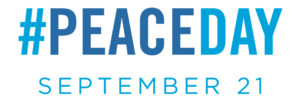
A logo for the International Day of Peace
On the occasion of the International Day of Peace 2016, Rachel Corrie Foundation 2016 Scholarship recipient, Dakota Rakestraw, wrote an incisive op-ed published on Mondoweiss. Commemorated annually on 21 September, the United Nations event is a day for gauging humanity’s progress towards peace. Dakota challenges us to think critically about whether the United States is contributing to or hindering this goal in the context of Palestine, in particular.
Today, September 21st, is International Day of Peace. A United Nations Resolution instituted the commemoration in 1981 and the UN proclaimed theme for 2016 is “The Sustainable Developmental Goals: Building Blocks for Peace.” It is easy enough to agree with this statement, but how easy is it to act upon?
Earlier this year, French President François Hollande attempted to initiate peace talks between Palestinian and Israeli parties, hoping to revive the spirit of the Camp David talks of the 1990s. Facilitated by President Clinton, the Camp David talks brought Yasser Arafat, President of the Palestine Liberation Organization, and Ehud Barak, Prime Minister of Israel, together for talks on settling the ‘Palestinian-Israeli conflict’. The talks deteriorated with no tangible outcomes, each side blaming the other, and foreshadowed a legacy of perpetual peace talks continuing to the present. While the actual timeline of the Hollande-sponsored talks indicates they are scheduled at the end of 2016, a year when Prime Minister Benjamin Netanyahu has advocated to deport the families of Palestinian attackers from the West Bank to the Gaza Strip, expectations for these high-level negotiations are understandably low.





